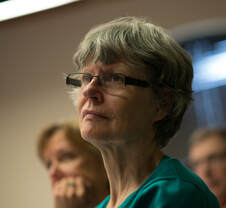“Intercultural Competence Development through Education Abroad: Key Concepts, Practical Applications”
The Institute for Cross-Cultural Teaching and Learning is pleased to invite you to register for the following:
Webinar: Belongingness in Education Abroad: Why it Matters and How its Assessment Can Support Inclusive Excellence
Date: Friday November 19, 2021, 1:00 – 2:00 pm Eastern time
Presenters: Elizabeth (Betsy) Brewer and Katherine Yngve
Click here to register
Date: Friday November 19, 2021, 1:00 – 2:00 pm Eastern time
Presenters: Elizabeth (Betsy) Brewer and Katherine Yngve
Click here to register
Belonging and belongingness in higher education and education abroad are important for all participants. However, they are particularly critical for students traditionally underrepresented in education abroad -- and for a profession that seeks to broaden and diversify its membership. Research findings indicate that when individuals feel accepted, valued, and encouraged, they are more likely to be successful, whether the context is educational, professional, or civic. Further, research within higher education has shown that when institutions create structures to support belongingness for racially minoritized students, more equitable educational results occur.
Somewhat perplexingly, however, belonging and belongingness and their contribution to education abroad learning outcomes have been both understudied and underassessed. This is despite the fact that most of those who work with education abroad students hope that their work will help students belong in their new environment. This kind of belongingness is often associated with cultural immersion and adaptation and education abroad programs are often designed to foster learning situations where belongingness--in the sense of cultural immersion and adaptation--can occur. But to what extent are we failing to support students from non-dominant cultures by failing to think critically about what expectations of adaptation mean? To what extent are we failing our own home communities by failing to hold returning education abroad students from dominant cultures accountable for combatting anti-belongingness in their post-study abroad lives? Regular, formative assessments can help our students not only learn but become more civically engaged life-long learners. Regular reflection on how we assess can also help education abroad, as a profession, practice the iterative improvement that is embodied in the term inclusive excellence.
In this webinar, based on a chapter in a forthcoming volume on Deepening Impact through Inclusive Practice in Education Abroad to be published by the Forum on Education Abroad, the chapter authors Katherine Yngve and Elizabeth Brewer, will make the case for paying close attention to belonging and belongingness throughout the education abroad experience.
Learning Outcomes:
Participants in this webinar will
Somewhat perplexingly, however, belonging and belongingness and their contribution to education abroad learning outcomes have been both understudied and underassessed. This is despite the fact that most of those who work with education abroad students hope that their work will help students belong in their new environment. This kind of belongingness is often associated with cultural immersion and adaptation and education abroad programs are often designed to foster learning situations where belongingness--in the sense of cultural immersion and adaptation--can occur. But to what extent are we failing to support students from non-dominant cultures by failing to think critically about what expectations of adaptation mean? To what extent are we failing our own home communities by failing to hold returning education abroad students from dominant cultures accountable for combatting anti-belongingness in their post-study abroad lives? Regular, formative assessments can help our students not only learn but become more civically engaged life-long learners. Regular reflection on how we assess can also help education abroad, as a profession, practice the iterative improvement that is embodied in the term inclusive excellence.
In this webinar, based on a chapter in a forthcoming volume on Deepening Impact through Inclusive Practice in Education Abroad to be published by the Forum on Education Abroad, the chapter authors Katherine Yngve and Elizabeth Brewer, will make the case for paying close attention to belonging and belongingness throughout the education abroad experience.
Learning Outcomes:
Participants in this webinar will
- Be able to define belonging and belongingness, particularly as these pertain to inclusive excellence in education abroad;
- Use a model for determining how belonging and belongingness do and do not occur; and
- Understand why and how assessment is key to fostering belonging and belongingness.
|
About the presenters:
Elizabeth (Betsy) Brewer led internationalization efforts at Beloit College from February 2002 to July 2021, and now works as a freelance writer and editor with a focus on higher education. Prior to joining Beloit College she was an associate dean for student affairs in the Graduate Faculty of the New School, directed Boston University’s study abroad office, and facilitated area studies and international programs at the University of Massachusetts at Amherst. Betsy’s publications include co-edited volumes (and her own chapter contributions) on Education Abroad and the Undergraduate Experience: Critical Perspectives and Approaches to Integration with Student Learning and Development (2019, Stylus), Assessing Study Abroad and Its Lessons (2015, Stylus), and Integrating Study Abroad into the Curriculum: Theory and Practice Across the Disciplines (2010, Stylus). She has also written on internationalizing the curriculum, comprehensive internationalization, and conducting internationalization reviews. Contact information: brewere@beloit.edu |

|
|
Katherine Yngve is a “recovering senior international officer” (Beirut, 2010-2013) and former education abroad professional (NAFSA regions IV & V, 1995-2010) who now works within institutional research as an intercultural outcomes specialist at Purdue University. She founded e-mentoring for Purdue study abroad participants in 2015, and launched intercultural pedagogy training for faculty in 2016. Prior to Purdue, she served as founding Director of International Programs at the American University of Beirut, in Lebanon. As a NAFSA member, she co-chaired the SECUSS-L listserv, served on the Intercultural Communication and Training sub-committee and co-authored a bibliography on Intercultural Training, Theory and Research.
Katherine’s more recent publications include, in addition to the co-authored chapter in Education abroad and the undergraduate experience referenced above, the introduction to the special issue on Assessment as Pedagogy, published by Frontiers: The Interdisciplinary Journal of Education Abroad in February 2021, and “Walking the Walk” of Inclusion: Assessment Resources that Support Equity in Learning, Teaching and Mentoring (2019, ACRL Presidents Program EDI Discussions blog). Contact information: kyngve@purdue.edu |

|